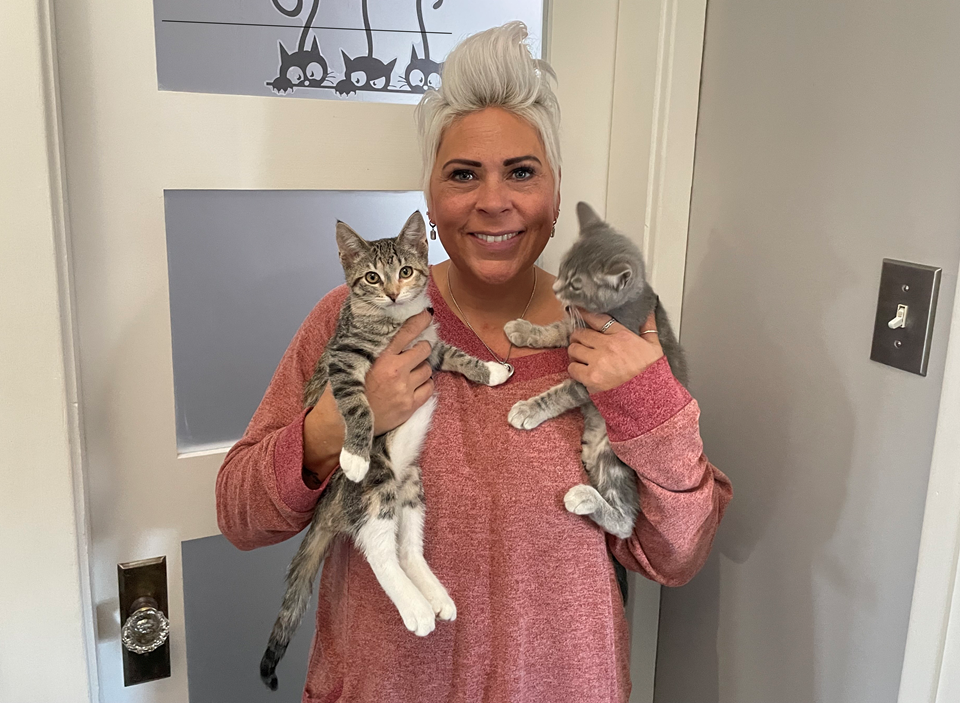REGINA - The Regina Cat Rescue has recently stopped taking in new animals due to a number of factors.
Tanya Mihalicz, pet rescue lead and foster coordinator with the Regina Cat Rescue, explained the reasons that led to this decision.
"With a combination of rising costs for pet food and veterinary care combined with decreased donations, [lesser] fundraising support and [fewer] volunteers. we're in a difficult place where we need to halt intakes to be sure we can continue to provide the necessities for the 350 cats that we currently have."
Mihalicz herself takes care of 30-plus cats in her home alone. She mentioned this was not an easy decision for the organization but noted they can’t rely on people taking in rescue animals or receiving donations because of the rising costs of housing, food, gas and other essentials.
With the current 350 cats the Regina Cat Rescue currently looks over, Mihalicz emphasized that because the group cannot take in any more cats for the time being, hundreds of cats on the streets reproducing alone will increase the animals population by thousands in the city.
Because of this, Mihalicz feels more people will see stray cats on the street. For example, the Regina Cat Rescue was notified by an individual about two kittens who were found in a bag in an alleyway. The kittens, Wiley and Remmy, have since been sheltered and fed by the non-profit group.
Seeing these kittens end up alone was a "heartbreaking situation," said Mihalicz. However, she pointed out, "in truth, you know, that's just one situation that we found out about this time. [It is important to realize that] this is a common occurrence that happens [a lot]."
To control the growing number of cats living outside in Regina, Mihalicz believes the best course to control the growing cat population is to implement the trap-neuter-return (TNR) method across the city. TNR is where cats are taken in by a shelter or organization and get neutered. After getting neutered, the cat is released back into its home, where it can no longer reproduce.
Mihalicz believes this can be the most effective way to control the overpopulation of cats, which she called "an epidemic."
Even though the method could help control the population of cats, the Regina Cat Rescue is currently the only place in the city that offers a TNR program, said Mihalicz. Compared to Regina, Mihalicz noted how other major Canadian cities, like Edmonton offer a large TNR program to control the cat population, which helps manage new strays coming in.
Since the Regina Cat Rescue is the only place offering TNRs, Mihalicz said the non-profit group is losing more ground every year as the problem continues to increase.
Adding on top of playing catch up, with funding concerns getting so bad, Mihalicz admitted, "we're considering having to do a recovery year, you know, where we just keep our intake freeze on for the [whole] year."
Potentially doing an intake freeze for the whole year stems from the Regina Cat Rescue no longer breaking even like they have in past years, which Mihalicz believes this is the first time that has happened.
When asked if that decision would be hard for her, Mihalicz responded with, "there's not even words that can describe how tough that'll be for me, you know, it is tough now having to, you know, say no to someone [regarding taking care of a new cat]."
She added, "we dedicate ourselves to these [causes] because we're passionate about it [and] because we love animals. We love [all] cats, in particular at the RCR (Regina Cat Rescue). So if we are unable to help them, I mean especially like kittens, knowing that there are kittens out there going into winter that probably won't survive, you know, it's absolutely heartbreaking."
Regarding the cold, Mihalicz said, "in -30 [C] [and or] -40 [C] whether [it's] their ears [or] their noses [or] their paws like these are all extremely vulnerable [conditions] and cats will freeze. They will literally freeze like to death."
Not only are the Regina Cat Rescue struggling to take in animals, but the Regina Humane Society is also finding it difficult to bring wildlife off the streets, as Mihalicz noted. This could lead to animals having to be euthanized, a method that the Regina Cat Rescue does not use.
With nowhere else to turn, Mihalicz is calling on the City of Regina to "take the initiative, you know, to support the program of TNR, you know, to try to get things under control in this city. It can't be done without the support [of Regina]. It can't be done without the funds."
She is also encouraging people to do what they can to help out cats, whether that be providing food, water, and shelter. Citizens can also donate money to the or look for a chance to volunteer.




